

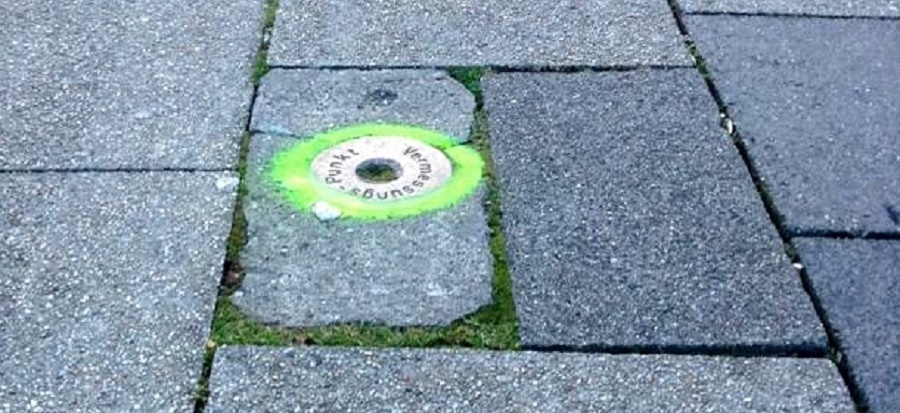
FIG is the premier international organization representing the interests of surveyors worldwide. It is a federation of the national member associations and covers the whole range of professional fields within the global surveying, geomatics, geodesy and geo-information community. It provides an international forum for discussion and development aiming to promote professional practice and standards.
FIG was founded on July 18 1878 in Paris by delegates from seven national associations - Belgium, France, Germany, Great Britain, Italy, Spain and Switzerland - and was known as the Fédération Internationale des Géomètres. This has become anglicized to the International Federation of Surveyors. It is a UN-recognized non-government organization (NGO), representing more than 120 countries throughout the world, and its aim is to ensure that the disciplines of surveying and all who practise them meet the needs of the markets and communities that they serve.
Surveying is a modern profession acting worldwide for a better infrastructure for our society and planet earth. The International Federation of Surveyors (FIG) wants to keep, and even improve, its role as the premier non-governmental organisation that represents the interests of surveyors worldwide.
FIG’s activities are governed by a work plan, which is approved by the General Assembly and reviewed by Council as its tenure progresses. The current work plan with the motto “Volunteering for the Future ” guides Council, Commissions, Networks and Task Force in their activities.
FIG supports the role of a prosperous and sustainable profession of surveyors to provide solution functionality, reliably, affordably for a complex and rapidly changing world that cannot wait, and to translate a sustainable development agenda into action. FIG supports international collaboration among its members for the progress of surveying in all its fields and applications. FIG has a close cooperation with United Nations relevant bodies, World Bank, and its sister associations and has been globally recognized as the leading international non-governmental organization on geospatial information and the management of “land”, the “sea” and the “built” environment. It is within the surveyors’ task to determine the size and shape of the earth, to map its surface and to manage it in a sustainable way.
FIG draws its membership from practitioners working in communities with both the public and private sectors, from the scientific, research and academic community, as well as from the spatial technologies and services community. FIG functions with the goodwill, resources and contribution of its memberships and their corp of volunteers from around the world.
Members of FIG consist of:
The benefits for all classes of membership of FIG include:
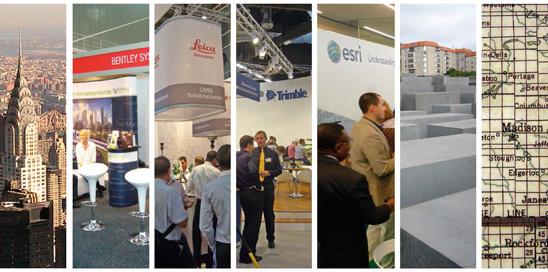 |
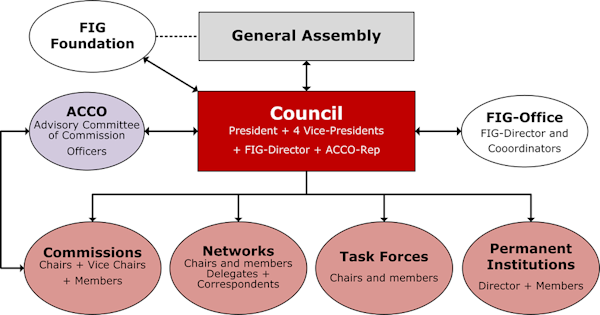
Ten commissions lead FIG’s technical work. Each member association appoints a delegate to each of the commissions. Detailed information on the work of the commissions, their work plans, working groups, seminars, newsletters and publications can be found at www.fig.net/organisation/comm/. The terms of reference are as follows:
The terms of reference are as follows:
Chair: Mr. Timothy Burch (United States)
Perception of surveying profession; professional practice, legal aspects and organizational structures; standards and certification; code of ethics and applications; under-represented groups in surveying; students and young surveyors; information technology management and professional practice; project management, quality and best practice
Chair: Dr. Dimo Todorovski (The Netherlands)
Curriculum development; learning and teaching methods and technologies; educational management and marketing; continuing professional development; networking in education and training.
Chair: Dr. Sagi Dalyot (Israel)
Management of spatial information about land, property and marine data; spatial data infrastructure – data collection, analysis, visualisation, standardisation, dissemination, and support of good governance; knowledge management for SIM; business models, public-private-partnerships, professional practice and administration.
Chair: Dr. Malavige Don Eranda Kanchana Gunathilaka (Sri Lanka)
Hydrographic surveying; hydrographic education, training and CPD; marine environment and coastal zone management; data processing and management; nautical charting and bathymetric maps – analogue and digital, including electronic navigational charts.
Chair: Dr. Ryan Keenan (Australia)
The science of measurement including instrumentation, methodology and guidelines; the acquisition of accurate and reliable survey data related to the position, size and shape of natural and artificial features of the earth and its environment and including variation with time.
Chair: Prof. Dr. Werner Lienhart (Austria)
Acquisition, processing and management of topometric data; quality control and validation for civil engineering constructions and manufacturing of large objects; modern concepts for setting-out and machine guidance; deformation monitoring systems; automatic measuring systems, multi-sensor measuring systems; terrestrial laser systems.
Chair: Dr. Rohan Bennett (Australia)
Cadastre, land administration and land management; development of pro poor land management and land administration; development of sustainable land administration as an infrastructure for sustainable development to underpin economic growth; applications of innovative and advanced technology in cadastre and land administration; promoting the role of surveyors in land administration matters to the public and stakeholders.
Chair: Mr. Kwabena Asiama (Ghana)
Regional and local structure planning; urban and rural land use planning and implementation; planning policies and environmental management for sustainable development; re-engineering of mega cities; public-private partnerships; informal settlement issues in spatial development, planning and governance.
Chair: Mr. Peter R. Ache (Germany)
Valuation; investment in real estate and investment planning; real estate investment vehicles; real estate, development finance and land use feasibility planning; real estate economics and markets and market analyses; management of property and property systems; management of public sector property.
Chair: Ms. Mercy Iyorter (Nigeria)
Construction economics, including quantity surveying, building surveying, cost engineering and management; estimating and tendering; commercial management including procurement, risk management and contracts; project and programme management including planning and scheduling.
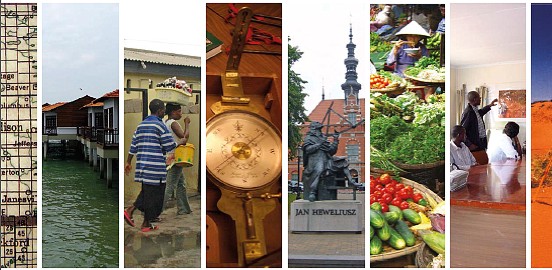 |
Chair: Ms. Shirley Chapunza (Zimbabwe)
FIG Young Surveyors Network addresses the need for young surveyor representation within FIG, and the need to ensure FIG activities are meeting the needs of students and young professionals.
Chair: Dr. Diane Dumashie (RICS, United Kingdom)
Africa: Chair: Mr. Mohammed Mamman Kabir (Nigeria)
America: Chair: Mr. Dan Roman (United States)
Asia/Pacific: Chair: Mr. Robert Sarib (Australia)
This network originates from the Africa Task Force 2009–2014 and was transformed into a Network.
Chair: Mr. David Martin (ESRF, France)
Standards are continuously important in the work of surveyors. In 2012 the Standards Network succeeded in publishing the Land Administration Domain Model (LADM) as ISO Standard19152.
Director: Mr. Jan de Graeve (UBGE, Belgium)
Director: Dr. Eva-Maria Unger (Austria)
Chair: Ms. Paula Dijkstra (the Netherlands)
The task force identifies relevant SDGs for FIG and its Commissions, assesses the needs, requirements and opportunities for FIG and explores solutions, approaches, curricula and tools to boost the achievement of the SDGs
Co-Chairs: Ms. Roshni Sharma (Australia) and Ms. Clarissa Augustinus (Ireland)
The task force will examine and actively promote the engagement and role that surveyors can have in contributing to the climate change agenda.
Co-Chairs: Mr. Prof Abbas Rajabifard (Australia) and Ms. Dr. Kirsikka Riekkinen (Finland)
The Task Force centred upon the involvement of our profession in geospatial fields to re-position its international standing and assert the essential relevance of geospatial experts in international markets.
Chair: Mr. Stephen Djaba (Ghana)
The task force aims to promote diversity and inclusion within the surveying profession, not only in terms of race, gender, and ethnicity, but also in terms of age and generational diversity, including Gen X, Y, and Z.
President: Mr. Bryn Fosburgh (USA)
The FIG Foundation is an independent body under the Federation giving grants
and scholarships to support education and capacity building especially in
developing countries. Contributions are received
through conferences, corporations, and private donators.
The commissions prepare and conduct the programme for FIG’s international congresses, held every four years, and annual working weeks, held in the intervening years. The two previous congresses were held in Kuala Lumpur (Malaysia) in 2014 and Istanbul (Turkey) in 2018. The next congress will be held in 2022 in Warsaw (Poland). Congresses attract several thousand participants from all over the world and are the most important events in the FIG calendar. The technical programme, which marks the culmination of each commission’s four-year programme of work, is complemented by a major international exhibition.
Working Weeks combine meetings of FIG’s administrative bodies with technical conferences organized by the commissions and the host member association and as such provide the opportunity for commissions to implement and develop their work programmes and for FIG to network at a more regional level. In 2019 the Working Week was held in Hanoi (Vietnam). Due to Covid-19 the Working Week 2020 was replaced with an article series and in 2021 it was organized, together with Dutch local organizers, as an online event. The 2023 Working Week takes place in Orlando, United States. To increase regional activities FIG also organizes regional conferences, the most recent of which was held in Uruguay in November 2012.
In addition to their involvement with FIG congresses and working weeks, commissions and their working groups organize or co-sponsor a wide range of seminars and workshops, usually in collaboration with member associations or other international professional bodies.
A key element to the success of a commissions work is the appointment of national delegates, providing a unique opportunity for professional development. Member associations, affiliates, corporate members and academic members are all entitled to appoint delegates to the commissions; and commission chairs often co-opt additional experts to assist with particular aspects of their work programmes.
By its General Assembly which meets annually during the FIG Working Week or the FIG Congress. The General Assembly comprises of delegates of the member associations and, as non-voting members, the Council, commission chairs and representatives of affiliates, and corporate and academic members. The General Assembly debates and approves policies and implemented by the Council.
The Council is elected by the General Assembly. The Council consists of the President (elected for four year term of office) and four Vice Presidents (term of office is four years) with two of the Vice Presidents being elected every second year, and coming from different countries throughout the world. In addition commission chairs appoint their representative to the Council.
The work of the General Assembly and the Council is assisted by an Advisory Committee of Commission Officers (ACCO); ad hoc task forces appointed from time to time to review existing work plans; three networks; and two permanent institutions.
President:
Vice-Presidents:
Term 2023-24:
For details on the current council see: www.fig.net/organisation/council/
The FIG Office is located in Copenhagen, Denmark.
Address:
FIG Office
Kalvebod Brygge 31-33,
DK-1780 Copenhagen V, Denmark.
Tel: +45 3886 1081
E-mail: fig@fig.net
Further information about the FIG office at:
www.fig.net/about/office/index.asp
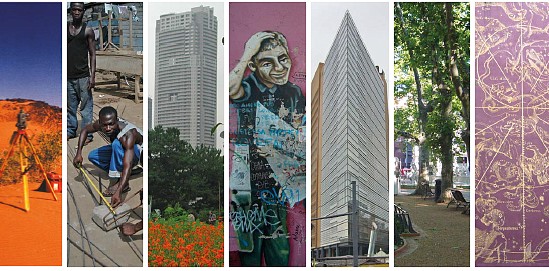 |
Members’ annual membership fees largely finance operating costs. Rates of membership fees payable by member associations are approved annually by the General Assembly. The Council sets rates of membership fees payable by affiliates, corporate and academic members.
Other activities, including congresses, technical seminars and administrative meetings, are mostly self-financing. In the case of meetings, income is raised from registration fees, which may be supplemented by income from an accompanying technical exhibition, by subventions from the host government or association, or by grants from aid agencies.
FIG international co-operations include:
The benefits for all classes of membership of FIG include:
For further information about FIG and its activities consult the homepage at: www.fig.net